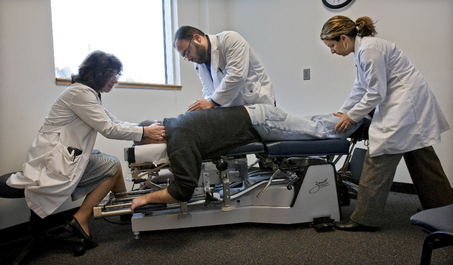March 15, 2012—Alternative health providers, including naturopathic doctors, chiropractors, massage therapists and acupuncturists, are turning to the Oregon Health Authority’s rule making process for coordinated care organizations (CCOs) to make certain their provider groups are on board.
The state agency’s rule making process for CCOs, which is expected to be completed within a month, spells out the rules and regulations that will govern CCOs in a way that reflects the legislative intent of House Bill 3650 and Senate Bill 1580, which set in motion the transformative healthcare system.

Coordinated care organizations will be comprised of patient teams that include doctors, nurses, behavioral health providers, community health workers, and other providers who will integrate physical, mental and dental healthcare to the 600,000 patients on the Oregon Health Plan. The hope is that by focusing on preventive care and reducing emergency room utilization, costs can be reduced. CCOs are expected to become operational in August.
Alternative provider groups scored a victory when language prohibiting discrimination against their provider groups was included in the legislation, as well as language allowing providers to appeal decisions made by a CCO to the Oregon Health Authority.
They were concerned that without such explicit language, they would have been excluded.
“Our experience as alternative providers has been that when anything is left vague…we are always eliminated or left out,” said Jan Ferrante, the executive director of the Oregon Chiropractors Association.
That discrimination, she and others say, comes from a deep-seated bias in the healthcare industry against alternative providers.
“[Managed care organizations]…almost categorically refuse to credential [naturopathic doctors], for reasons ranging from they’re governed by MDs and are unlikely to credential other providers, to their leadership is philosophically opposed to naturopathic medicine,” Laura Farr, president of the Oregon Association of Naturopathic Physicians, told legislators.
Although the non-discrimination language was an important battle to win, Farr believes more needs to be done to integrate alternative providers into the healthcare system.
And, she called the non-discrimination language passive, saying it “does little” to guarantee that patients will have the same access to naturopathic physicians and other alternative health providers. “The end result is very, in my opinion, generic language,” Farr said.
Farr and Laverne Saboe, the lobbyist for the Oregon Chiropractors Association, thinks there’s an opportunity during the rule-making process to create more explicit guidelines for alternative providers in CCOs.
Saboe said the rule-making process will determine what constitutes an adequate network of providers in a CCO, as well as provider types, qualifications and disciplines. Farr also said the process will include defining terms such as “provider” and “primary care provider,” and is hopeful that these definitions will explicitly mention naturopathic doctors and other alternative provider groups.
Another issue yet to be determined is how alternative providers will be reimbursed. The legislation gives CCOs the ability to reimburse providers at different levels based upon the quality of care they offer and their performance.
Saboe doesn’t believe alternative providers will be reimbursed at a lower rate than mainstream providers. “There are good evidence-based outcomes assessment tools…that’s not necessarily subjective,” Saboe said, including patient satisfaction.
Farr and others would like alternative providers to become integrated in CCOs throughout the state. “We’ll have better luck in some communities than we will in others,” she said.
At stake, she and others say, is whether Oregon Health Plan patients will be able to see providers that they believe can improve their health status. Laura Ocker, the president of the Oregon Association of Acupuncture and Oriental Medicine, points out that patients respond differently to medications and therapies, making flexibility essential.
“There have to be alternative therapies,” she said. “That gives the patient the full ability to look around and ask ‘what's effective for me?’”
“Consumers should have access to those providers…and there should not be such a restrictive network that it will be difficult for them to get an appointment,” Saboe said.
Image for this story appears courtesy of The Oregonian.